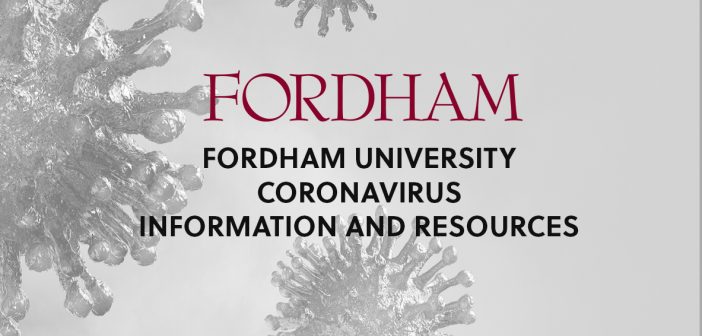January 24, 2020
Fordham University has been closely monitoring the emerging public health problem regarding an outbreak of a new strain of coronavirus (Novel Coronavirus 2019-nCoV) in Wuhan, China. Possible infections of the virus were reported in other regions of China, and in some travelers from Wuhan to other countries, including the United States (the first U.S. case was reported in Washington State on January 21, 2020).
The new Coronavirus causes a respiratory illness. There are other viruses in the Coronavirus family that can cause illness in both humans and animals. These viruses can cause either mild, cold-like illnesses, more serious illnesses like pneumonia. This particular Coronavirus has not been seen previously in humans. The virus is likely to be spread from person to person. Since the virus is very new, health authorities continue to carefully monitor how this virus spreads. There is no vaccine or treatment available for this or other coronaviruses.
There are currently no confirmed cases of this virus at Fordham University.
Diagnosis and Prevention
Symptoms of Coronavirus may include fever, cough, and shortness of breath, runny nose, headache, and sore throat. In severe cases, the virus can cause pneumonia.
Any student experiencing symptoms should call University Health Services (UHS) immediately:
- Lincoln Center: (212) 636-7160
- Rose Hill: (718) 817-4160
After business hours contact the Department of Public Safety at (718) 817-2222. Someone will be available to take your call at this number 24/7.
Faculty and staff experiencing symptoms should call their primary care physician immediately for direction.
Anyone experiencing symptoms is strongly encouraged to avoid class/work, and to stay at home or in your residence hall room at least until you have consulted with a health care provider.
Ways to Stay Healthy
• Wash your hands frequently with soap and water
• Increase your fluid intake
• Avoid touching your eyes, nose, mouth, face
• Keep home/personal spaces clean, disinfect common surfaces
• Avoid contact with sick people
• Cover your cough with tissue/paper towel or the crook of your elbow
• If you have not received an Influenza (Flu) vaccine this year, do get one as soon as possible.
Travel
The University strongly discourages any travel to any of the countries affected by the Coronavirus outbreak at this time. The University encourages students who may have traveled from Wuhan City or other parts of China, and who are experiencing symptoms, to contact University Health Services or Public Safety at the numbers above immediately. Faculty and staff who may have traveled from Wuhan City or other parts of China, and who are experiencing symptoms, should see their primary care providers.
University Precautions
Since the fall semester (concurrent with the beginning of Flu Season), Fordham Facilities staff have been performing at least daily cleanings of common restrooms, athletics facilities, and other sensitive locations with approved disinfectants. Some locations are cleaned/treated more than once a day. Those precautions have been increased. UHS staff are in daily contact with New York City Department of Health officials, and are monitoring the progress of the outbreak in the U.S. and abroad carefully.
Campus Culture
Please be aware that the wearing surgical or face masks in public spaces does not indicate the person in question is ill or infected with the Coronavirus (or any other illness). Many people, including those of Asian backgrounds, wear these masks as a precaution against themselves getting ill.
Guidelines from the New York City Department of Health & Mental Hygiene
The New York City Department of Health and Mental Hygiene recommends those with fever and cough with travel history from Wuhan City within 14 days of their symptom onset, and with specific clinical and risk criteria as listed below:
- Fever AND symptoms of lower respiratory illness (e.g., cough, shortness of breath) with
- recent travel to Wuhan in the last 14 days before symptom onset, -or-
- Close contact with a person who is under investigation for 2019-nCoV while that person was ill.
- Fever OR symptoms of lower respiratory illness (e.g., cough, shortness of breath), and in the last 14 days before symptom onset,
• Close contact with a laboratory-confirmed 2019-nCoV patient
For more information, visit:
https://www.cdc.gov/coronavirus/2019-nCoV/
https://www1.nyc.gov/site/doh/health/health-topics/coronavirus.page
Maureen Keown, MSN, Director
University Health Services



